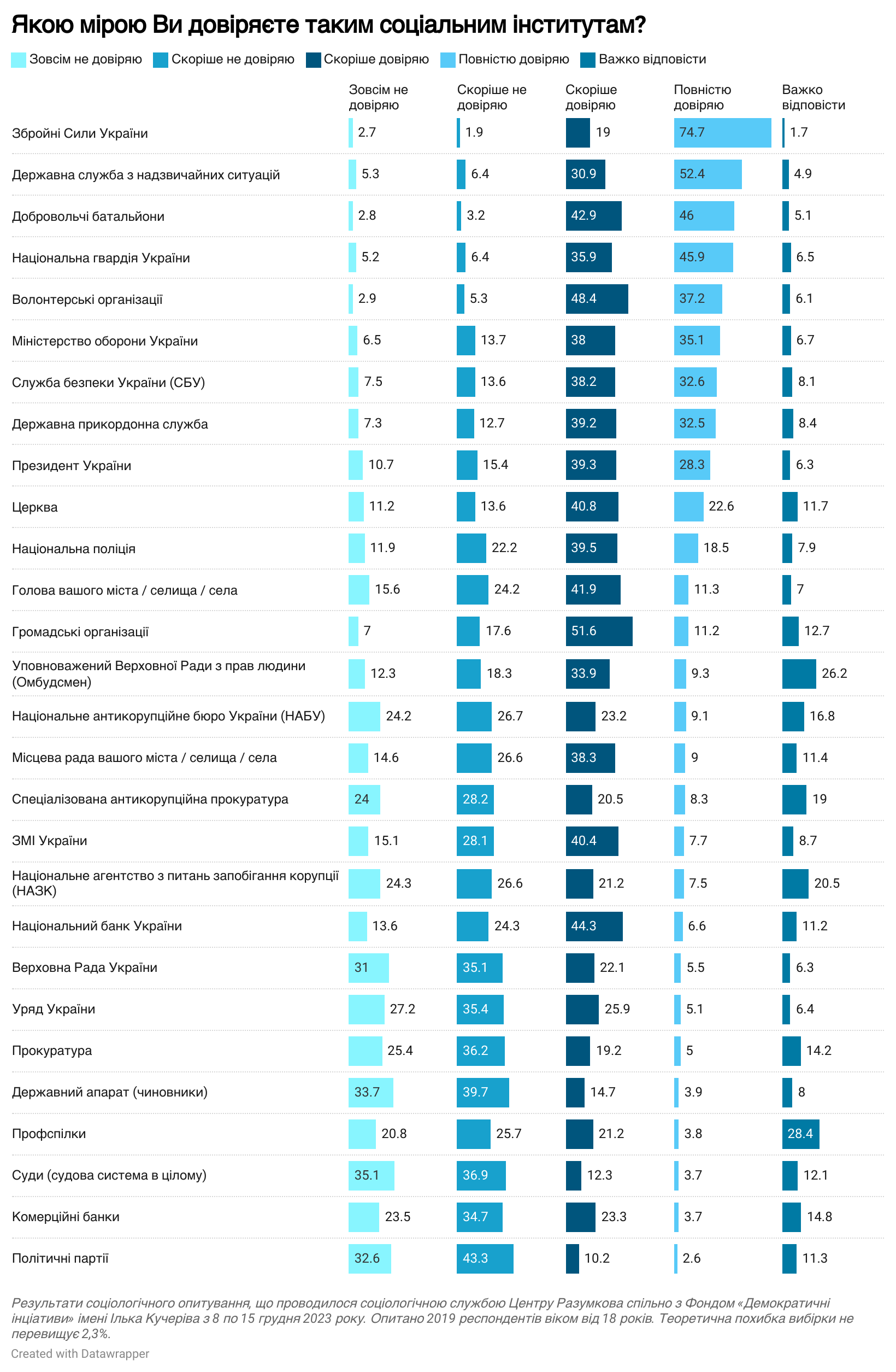Of all Ukrainian state and public institutions, the Armed Forces enjoys the most trust – 94% of respondents surveyed by the Razumkov Center sociology service in partnership with the Ilko Kucheriv Democratic Initiatives Foundation.
The UAF is followed by volunteer units (89%), volunteer organizations (86%), the State Emergency Service (83%), the National Guard of Ukraine (82%), the Ukrainian Ministry of Defense (73%), the State Border Guard Service (72%), the SBU (71%), the Ukrainian President (68%), the Church (63%), civil society organizations (63%), the National Police of Ukraine (58%), the respondents’ city (town, village) Mayors (53%), the National Bank of Ukraine (51%).
More people have expressed trust in Ukrainian mass media than mistrust (48% and 43% respectively).

How much trust do you have in these social institutions? The Ukrainian Armed Forces; the State Emergency Service; volunteer battalions; the National Guard of Ukraine; volunteer organizations; the Ukrainian Ministry of Defense; the Security Service of Ukraine (SBU); the State Border Guard Service; the Ukrainian President; the Church; the National Police; the Mayor of your city/town/village; civil society organizations; the Verkhovna Rada Commissioner (Ombudsman) for Human Rights; the National Anti-Corruption Bureau of Ukraine (NABU); the local council of your city/town/village; the Specialized Anti-Corruption Prosecutor’s Office; Ukrainian mass media; the National Agency for Corruption Prevention (NACP); the National Bank of Ukraine; the Verkhovna Rada of Ukraine; the Ukrainian government; the Prosecutor’s Office; the state apparatus (officials); trade unions; courts (the judiciary as a whole); commercial banks; political parties. Answer options: No trust / Little trust / Mostly trust / Full trust / Hard to say. These are the results of a survey by the Razumkov Center sociology service in partnership with the Ilko Kucheriv Democratic Initiatives Foundation (December 8–15, 2023). The sample included 2019 respondents over 18 years of age. The theoretical error margin is below 2,3%.
Photo – dif.org.ua
The trust / mistrust ratio when it comes of the local city (town, village) council where a respondent lives is 47% to 41%, and in the case of the Verkhovna Rada Commissioner (Ombudsman) for Human Rights – 43% to 31%.
Most respondents expressed mistrust in political parties (76%), the state apparatus (officials) (73%), the courts (the judiciary as a whole) (72%), the Verkhovna Rada of Ukraine (66%), the Ukrainian government (63%), the Prosecutor’s Office (62%), commercial banks (58%), the Specialized Anti-Corruption Prosecutor’s Office (52%), the National Agency for Corruption Prevention (51%), the National Anti-Corruption Bureau of Ukraine (51%).
Mistrust in trade unions was also expressed more often than trust (46.5% as opposed to 25%).
The nationwide sociological survey took place on December 8–15, 2023, by way of face-to-face interviews. The survey covered the Vinnytsia, Volyn, Dnipropetrovsk, Zhytomyr, Zakarpattia, Zaporizhzhia, Ivano-Frankivsk, Kyiv, Kirovohrad, Lviv, Mykolaiv, Odesa, Poltava, Rivne, Sumy, Ternopil, Kharkiv, Kherson, Khmelnytsky, Cherkasy, Chernihiv, Chernivtsi oblasts and in Kyiv city (in the cases of Zaporizhzhia, Mykolaiv, Kharkiv, Kherson oblast the survey only took place on the territories controlled by the Ukrainian government that are not combat areas).
The sample included 2019 respondents over 18 years of age. The theoretical error margin was below 2,3%. However, additional systematic sample deviations may be caused by the impact of Russia’s aggression, such as the forced displacement of millions of citizens.
As the IMI reported, according to the all-Ukrainian survey on the dynamics of trust in social institutions in 2021–2023 by the Kyiv International Institute of Sociology (November 29 – December 9, 2023), trust in Ukrainian media dropped significantly in 2023, with trust indicators going back to the December 2021 level.
